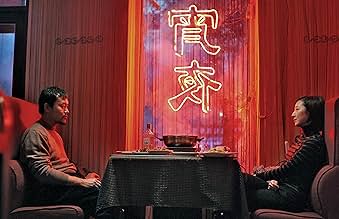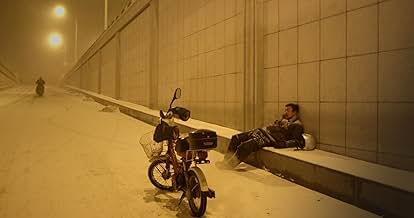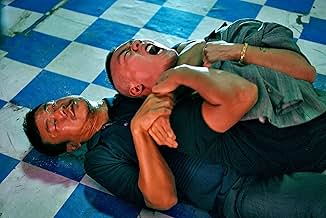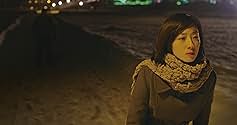IMDb रेटिंग
6.7/10
10 हज़ार
आपकी रेटिंग
एक पूर्व पुलिस कर्मचारी और उसके पूर्व साथी ने हत्याओं की उस श्रृंखला की जांच करने का फैसला किया, जिसने उन्हें शर्मिंदा कर उनके करियर को समाप्त कर दिया था, जब हुबहू वैसी ही हत्याएं फिर शुरू ह... सभी पढ़ेंएक पूर्व पुलिस कर्मचारी और उसके पूर्व साथी ने हत्याओं की उस श्रृंखला की जांच करने का फैसला किया, जिसने उन्हें शर्मिंदा कर उनके करियर को समाप्त कर दिया था, जब हुबहू वैसी ही हत्याएं फिर शुरू हो जाती हैं.एक पूर्व पुलिस कर्मचारी और उसके पूर्व साथी ने हत्याओं की उस श्रृंखला की जांच करने का फैसला किया, जिसने उन्हें शर्मिंदा कर उनके करियर को समाप्त कर दिया था, जब हुबहू वैसी ही हत्याएं फिर शुरू हो जाती हैं.
- पुरस्कार
- 28 जीत और कुल 46 नामांकन
फ़ीचर्ड समीक्षाएं
In snow covered streets surrounded by perpetual darkness detectives and suspects are made distinguishable only by the soft glow of neon signs. Faces are shrouded by shadow, characters motives are unclear. We are in very classic noir territory in Black Coal, Thin Ice.
A brutal murder occurs in Northern China. Severed limbs appear simultaneously across the country in coal plants. The investigation into the murder is botched, leaving detective Zhang Zili injured, ashamed and without a job. Five years later, body parts are found in coal plants. Now an alcoholic and working as a security guard, Zhang once again finds himself in the pursuit of the mysterious mass murderer. The only connection between the two cases is a beautiful dry cleaning assistant Wu Zhizhen, who soon becomes the object of Zhang's obsession.
An intriguing combination of neo-noir and Chinese realism, Black Coal, Thin Ice demonstrates director Yi'nan Diao's genre literacy. From the lighting, to the troubled anti-hero, to the femme-fatale, the film is full of noir tropes. What makes the film unique is the camera's continual shift to the mundane. Unlike the modern Tarantino-inspired trend, the revelations and acts of violence are down-played. Plot takes a back seat to atmosphere as the audience is immersed in a bleak, nihilistic vision of modern China.
Winner of the Golden Bear at the Berlin film festival, Black Coal, Thin Ice has been a hit with critics but it's hard to see it winning any audience awards. The slow pace and dark, defeatist world view will be a turn off for most audience but if you don't view those as detractors, and if you are a fan of noir then this is a film to see.
A brutal murder occurs in Northern China. Severed limbs appear simultaneously across the country in coal plants. The investigation into the murder is botched, leaving detective Zhang Zili injured, ashamed and without a job. Five years later, body parts are found in coal plants. Now an alcoholic and working as a security guard, Zhang once again finds himself in the pursuit of the mysterious mass murderer. The only connection between the two cases is a beautiful dry cleaning assistant Wu Zhizhen, who soon becomes the object of Zhang's obsession.
An intriguing combination of neo-noir and Chinese realism, Black Coal, Thin Ice demonstrates director Yi'nan Diao's genre literacy. From the lighting, to the troubled anti-hero, to the femme-fatale, the film is full of noir tropes. What makes the film unique is the camera's continual shift to the mundane. Unlike the modern Tarantino-inspired trend, the revelations and acts of violence are down-played. Plot takes a back seat to atmosphere as the audience is immersed in a bleak, nihilistic vision of modern China.
Winner of the Golden Bear at the Berlin film festival, Black Coal, Thin Ice has been a hit with critics but it's hard to see it winning any audience awards. The slow pace and dark, defeatist world view will be a turn off for most audience but if you don't view those as detractors, and if you are a fan of noir then this is a film to see.
Black Coal, Thin Ice is the kind of film that can only be felt, the charming point of the film is the indescribable feeling you get from the unique atmosphere. It's a suspense film with sort of Film-Noir feeling, but the plot of the case actually is not so important. As I said, what matters is the feeling. Those empty street shots, environment background sounds, strange acts and even some dark humor tastes. It even looks like a Jia Zhangke's film sometimes.(Well, Jia Zhangke's name did appear in the thank list in the end credits.) Such feeling reached the top in the ending of the pyrotechnical in daytime, it not only reflect the title (The Chinese title is Bai ri yan huo, which means The Daylight Pyrotechnix.) but also release the depressed emotion and atmosphere. (The Uncut Version has very strange but interesting dark humor style scenes in the ending, but they are cut out in the Censored Mainland China Theatrical Version.)
The atmosphere in the film is nearly perfect, however the romance relationship between two characters is not believable at all. The whole film is based on that relationship, but it didn't convince me. Without the reliable relationship, the rest of the film seems not make sense at all. So yeah, it's a rare and unique film in Chinese cinema, it is well did in many aspects, but I don't think it is qualified for Golden Berlin Bear.
My score: 7.5 for the Uncut Version, 7.3 for the Mainland China Censored Theatrical Version.
The atmosphere in the film is nearly perfect, however the romance relationship between two characters is not believable at all. The whole film is based on that relationship, but it didn't convince me. Without the reliable relationship, the rest of the film seems not make sense at all. So yeah, it's a rare and unique film in Chinese cinema, it is well did in many aspects, but I don't think it is qualified for Golden Berlin Bear.
My score: 7.5 for the Uncut Version, 7.3 for the Mainland China Censored Theatrical Version.
Funny how all these genius critical theorists here are giving thumbs down to everything but have nothing to say. Why not take my review and bust it to bits, deconstruct it, tell us how horrible it is? Come on, make your sentences pirouette for me.
In the meantime...
How does a Chinese director empty the noir sensibility of any and all of the glamour associated with its Hollywood counterpart? How does it become a study in pure dourness and grimness? If you're Yi'nan Diao, the first thing you do is set it in a place as grim and dour as a northern Chinese factory town circa 1999. In this frozen wasteland that may or may not be Harbin - it doesn't matter, it could be Siberia - the ball gets rolling when dead body parts start showing up on the conveyor belt of a coal processing plant: after all, in this time and space in China, the human body is just another physical commodity
Following a bloody shootout that leaves the two main suspects and two of his partners dead, we jump forward five years to find the surviving detective, Zhang Zili, paralyzed by the trauma, retired from the police force and passed out in the snow in an alcoholic stupor. But things are never what they seem in noir, right? So he's dragged back into the case when a former partner of his suspects the involvement of a black widow- like female at the heart of the matter. An exotic call girl? A mysterious nightclub singer? No - just some depressed woman who works at a dry cleaner's where she's regularly mauled by her piggish oaf of a boss.
The plot is unimportant, really, because the film is one big painting, a night-time world where the neon signs of the internet gambling dens and bleak taxi-dancing joints are beaten into submission by the cold dark chill of northern China, where all color and light are sucked into the film's essence, which is nothing but a black hole, a gravitational death machine that swallows up every photon in sight. At one point, while spinning around the world's most depressing ice skating rink, Zili asks his former partner, "Does anybody ever really win at life?" Of course not. Like all the other catatonic ice skaters, he's just going round and round, sometimes ahead, sometimes behind (depending on one's point of view) getting nowhere while people continue to copulate and kill and die. The key to the film is the direct translation of the Chinese title, which means "daytime fireworks." I'll let you figure that out for yourself, but if you like your noir pitch-black, this one's for you.
In the meantime...
How does a Chinese director empty the noir sensibility of any and all of the glamour associated with its Hollywood counterpart? How does it become a study in pure dourness and grimness? If you're Yi'nan Diao, the first thing you do is set it in a place as grim and dour as a northern Chinese factory town circa 1999. In this frozen wasteland that may or may not be Harbin - it doesn't matter, it could be Siberia - the ball gets rolling when dead body parts start showing up on the conveyor belt of a coal processing plant: after all, in this time and space in China, the human body is just another physical commodity
Following a bloody shootout that leaves the two main suspects and two of his partners dead, we jump forward five years to find the surviving detective, Zhang Zili, paralyzed by the trauma, retired from the police force and passed out in the snow in an alcoholic stupor. But things are never what they seem in noir, right? So he's dragged back into the case when a former partner of his suspects the involvement of a black widow- like female at the heart of the matter. An exotic call girl? A mysterious nightclub singer? No - just some depressed woman who works at a dry cleaner's where she's regularly mauled by her piggish oaf of a boss.
The plot is unimportant, really, because the film is one big painting, a night-time world where the neon signs of the internet gambling dens and bleak taxi-dancing joints are beaten into submission by the cold dark chill of northern China, where all color and light are sucked into the film's essence, which is nothing but a black hole, a gravitational death machine that swallows up every photon in sight. At one point, while spinning around the world's most depressing ice skating rink, Zili asks his former partner, "Does anybody ever really win at life?" Of course not. Like all the other catatonic ice skaters, he's just going round and round, sometimes ahead, sometimes behind (depending on one's point of view) getting nowhere while people continue to copulate and kill and die. The key to the film is the direct translation of the Chinese title, which means "daytime fireworks." I'll let you figure that out for yourself, but if you like your noir pitch-black, this one's for you.
It seems that, every few years, there are one or two Chinese films that, despite being slow-paced, dark, and lacking A-list stars, somehow manage to attract a large domestic audience without being controversial enough to risk complete censorship. In 2014, the only example I have seen so far is this, Black Coal, Thin Ice. The reason for its domestic success is presumably because of its awards at the Berlin Film Festival.
As the story unfolds, despite being based around a series of murders, the film has a pace more similar to an art-house film than a crime- thriller. A couple of scenes were impressively disturbing, made even more so by the slow paced, subtle atmosphere surrounding them.
The setting of a polluted, dark, seedy city in a long Heilongjiang winter seems perfect for the noir tone of the film. A subtle musical score, with some dissonant strings combined with (terrible) Chinese pop songs (intra-diegetic) creates a fantastic atmosphere. The closest thing to it I have seen is Suzhou River, which, now I come to think of it, has a lot of similar motifs (I haven't seen Diao Yinan's previous films).
The acting performances were all impressive, the female lead (played by Taiwanese Gwei/Gui Lun-Mei) seemed suitably out of place in the Far Northeast of Mainland China. Liao Fan's male lead, and Wang Xuebing's character, were both impressive.
Despite a bit of dark humour that made me giggle, Black Coal, Thin Ice is a relentlessly grim and slightly disturbing film. I was impressed that it wasn't (more) censored in China, as it paints a pretty depressing picture. Despite being enthralled by the film, I won't be booking a flight to Heilongjiang any time soon.
As the story unfolds, despite being based around a series of murders, the film has a pace more similar to an art-house film than a crime- thriller. A couple of scenes were impressively disturbing, made even more so by the slow paced, subtle atmosphere surrounding them.
The setting of a polluted, dark, seedy city in a long Heilongjiang winter seems perfect for the noir tone of the film. A subtle musical score, with some dissonant strings combined with (terrible) Chinese pop songs (intra-diegetic) creates a fantastic atmosphere. The closest thing to it I have seen is Suzhou River, which, now I come to think of it, has a lot of similar motifs (I haven't seen Diao Yinan's previous films).
The acting performances were all impressive, the female lead (played by Taiwanese Gwei/Gui Lun-Mei) seemed suitably out of place in the Far Northeast of Mainland China. Liao Fan's male lead, and Wang Xuebing's character, were both impressive.
Despite a bit of dark humour that made me giggle, Black Coal, Thin Ice is a relentlessly grim and slightly disturbing film. I was impressed that it wasn't (more) censored in China, as it paints a pretty depressing picture. Despite being enthralled by the film, I won't be booking a flight to Heilongjiang any time soon.
An ex-detective re-investigates a strange unsolved murder case that effectively ended his career five years previously. In doing so he ends up becoming increasingly involved with a young woman who seems to be connected with a series of similar killings.
It was good to see an example of a Chinese neo-noir. My previous experience with films from China has been usually of movies of epic proportions with big production values. So it made for a refreshing change to see something more low-key and contemporary. This one sets out its stall very well with the sinister discovery of various body parts being found in bags of coal spread all over the country, huge distances apart. The introduction of a femme fatale into the mix only ups the intrigue level further. And I have to say that on the whole I did enjoy this film and found it compelling, with its Chinese origins ensuring that it was a little different and punctuated with unpredictable moments. By the end of the piece it would be only fair to say that some questions still remain. I thought the ending was really very strange indeed with an odd final few moments and an ambiguous feeling. It almost feels like a superfluous ending but maybe I missed something in it. In truth odd things happen on a number of occasions throughout this one and reasons are not always very forthcoming, I am guessing this is a film that would benefit from a re-watch possibly. Also good was the wintry atmosphere of the snowy locales where the action unfolds that created a feeling all of its own which worked well. But I would probably have to conclude that, while I definitely liked this one, it does falls short of being great. It's not really that suspenseful for this type of film and the plot development doesn't ultimately reveal all that good a mystery in the final analysis. Certainly a good enough movie I have to emphasise but it just has a few hard to ignore unsatisfying flaws as well though.
It was good to see an example of a Chinese neo-noir. My previous experience with films from China has been usually of movies of epic proportions with big production values. So it made for a refreshing change to see something more low-key and contemporary. This one sets out its stall very well with the sinister discovery of various body parts being found in bags of coal spread all over the country, huge distances apart. The introduction of a femme fatale into the mix only ups the intrigue level further. And I have to say that on the whole I did enjoy this film and found it compelling, with its Chinese origins ensuring that it was a little different and punctuated with unpredictable moments. By the end of the piece it would be only fair to say that some questions still remain. I thought the ending was really very strange indeed with an odd final few moments and an ambiguous feeling. It almost feels like a superfluous ending but maybe I missed something in it. In truth odd things happen on a number of occasions throughout this one and reasons are not always very forthcoming, I am guessing this is a film that would benefit from a re-watch possibly. Also good was the wintry atmosphere of the snowy locales where the action unfolds that created a feeling all of its own which worked well. But I would probably have to conclude that, while I definitely liked this one, it does falls short of being great. It's not really that suspenseful for this type of film and the plot development doesn't ultimately reveal all that good a mystery in the final analysis. Certainly a good enough movie I have to emphasise but it just has a few hard to ignore unsatisfying flaws as well though.
क्या आपको पता है
- ट्रिवियाThe literal translation of the Chinese title is 'Daylight Fireworks'. This is the name of the nightclub where Zhang learns a major lead, and is also echoed in the last scene.
- कनेक्शनReferences Xia nu Shisan Mei (1986)
टॉप पसंद
रेटिंग देने के लिए साइन-इन करें और वैयक्तिकृत सुझावों के लिए वॉचलिस्ट करें
- How long is Black Coal, Thin Ice?Alexa द्वारा संचालित
विवरण
- रिलीज़ की तारीख़
- कंट्री ऑफ़ ओरिजिन
- आधिकारिक साइट
- भाषा
- इस रूप में भी जाना जाता है
- Black Coal, Thin Ice
- फ़िल्माने की जगहें
- उत्पादन कंपनियां
- IMDbPro पर और कंपनी क्रेडिट देखें
बॉक्स ऑफ़िस
- दुनिया भर में सकल
- $1,68,30,885
- चलने की अवधि
- 1 घं 50 मि(110 min)
- रंग
- पक्ष अनुपात
- 1.85 : 1
इस पेज में योगदान दें
किसी बदलाव का सुझाव दें या अनुपलब्ध कॉन्टेंट जोड़ें























